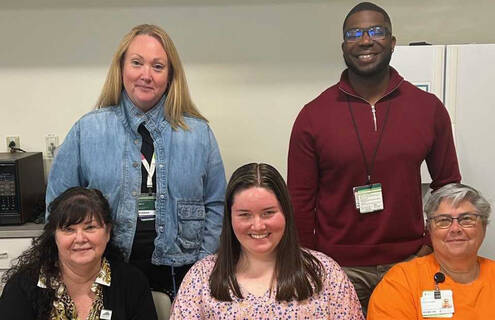
If you’re worried about how to feed your children, how can you focus on your own health and well-being?
If you don’t have transportation, how do you get to doctor’s appointments?
If you don’t have enough money to pay for your medications, what options do you have?
These are circumstances that many people deal with every day, and the consequences are significant.
Dartmouth Health’s Social Care Program aims to enhance overall well-being by answering questions like these and addressing what are considered social drivers of health.
Why addressing social needs matters to achieving good health
“Failure to address social needs can lead to worsening health conditions, increased hospitalizations and higher healthcare costs,” says Elizabeth “Beth” Morrill, MHA, Population Health manager. “Patients with unmet social needs often experience barriers to accessing care and managing chronic diseases effectively.”
Addressing the nonmedical factors in a person’s environment can help influence and improve health outcomes. These factors include food insecurity, transportation challenges, financial concerns and housing instability, all of which the Social Care Program works to address.
The program also helps patients overcome barriers to healthcare, such as cost and insurance limitations, geographic isolation, provider shortages and transportation difficulties.
“The primary goal of the program is to improve patient health outcomes by identifying and addressing social needs that impact health outcomes,” Morrill says. “By integrating social care into healthcare, Dartmouth Health seeks to reduce health disparities and promote equity, particularly in rural communities.”
How the program is structured
To accomplish the program’s goals, Dartmouth Health employs strategies such as the integration of social care into primary care settings, utilizing telehealth services, and collaborating with community partners to extend reach and resources.
At the forefront of the initiative are more than 40 employees who function as social care navigators across the Dartmouth Health system. These employees have various job titles, including community health workers or navigators and resource specialists.
“Once social needs are identified by the social care navigators,” says Shannon Donnelly, MBA, CCHW, Population Health supervisor, “they work with patients to connect them with community-based organizations that can provide assistance, such as housing support, food programs or financial aid services.”
She adds, “Dartmouth Health collaborates with a network of community-based organizations, including housing agencies, food banks, transportation services, and financial assistance programs. These partnerships enable a coordinated approach to addressing patients’ social needs, with staff facilitating referrals and follow-ups.”
The staff operate primarily within primary care and specialty care settings, where screening is done during visits. This proactive approach allows for early identification of nonmedical factors that may affect health. It also ensures that social needs are identified and addressed as part of comprehensive patient care. The program is primarily funded through operational funds and supplemented by grants and philanthropic contributions.
The program’s past, present and future
Last year, the program screened more than 100,000 patients, with 29 percent reporting at least one unmet social need. Social isolation was the most reported concern. After that, in order, were financial, food insecurity, shelter and transportation.
“We hope to grow this workforce and offer them professional development,” Morrill says.
This past spring, the New Hampshire legislature created a voluntary Community Health Worker (CHW) certification program. Dartmouth Health now employs 13 certified CHWs.
“The aspiration is that by alleviating social care burdens, patients can focus more on their physical health, leading to improved overall well-being and reduced health disparities across communities,” Morrill says.
This article was first published in the June 2025 issue of the Dartmouth Health employee magazine, Connections, under the title "Removing Barriers to Care" and has been adapted for the web.


